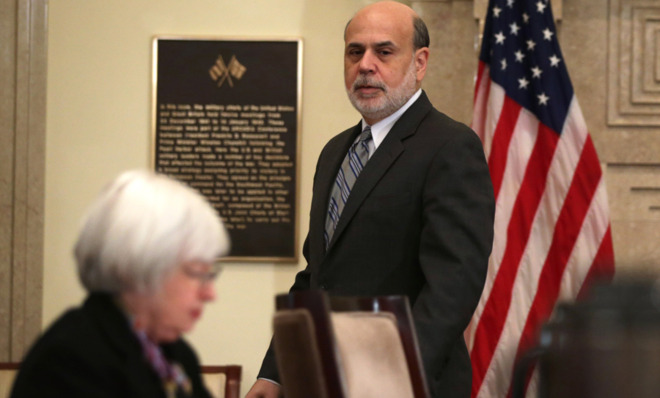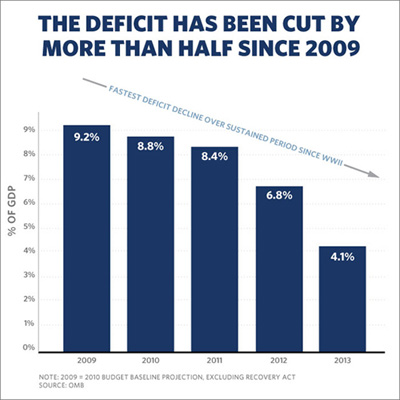Why don't Americans realize the deficit is falling?
In the eyes of voters, deficit reduction is more myth than reality

A free daily email with the biggest news stories of the day – and the best features from TheWeek.com
You are now subscribed
Your newsletter sign-up was successful
Since Barack Obama was inaugurated in 2009, the federal deficit has fallen dramatically. It has dropped as a percentage of the economy:

And it has also fallen in absolute terms.
In fact, the deficit reduction has been so steep that some economists believe that it has been excessive.
The Week
Escape your echo chamber. Get the facts behind the news, plus analysis from multiple perspectives.

Sign up for The Week's Free Newsletters
From our morning news briefing to a weekly Good News Newsletter, get the best of The Week delivered directly to your inbox.
From our morning news briefing to a weekly Good News Newsletter, get the best of The Week delivered directly to your inbox.
But according to polling, most people are entirely unaware of this trend. Recent polling by Pew suggests just 29 percent of Americans believe the deficit was reduced in the last year, including just 12 percent of Republicans.
To put this in context, fewer Republicans believe that the deficit is shrinking than believe in evolution (43 percent) or man-made climate change (24 percent).
And it's not just Republicans who are unaware that the deficit is falling. Just 50 percent of Democrats and 23 percent of Independents believe the deficit is coming down.
So, what's going on here?
A free daily email with the biggest news stories of the day – and the best features from TheWeek.com
I would guess that it’s a combination of two things. First of all, economists, politicians, and pundits are failing to communicate the facts to the public, or deliberately misleading voters. It is easy for reality to get lost in spin and manufactured narratives.
Second — and more importantly — large numbers of people may be confusing the deficit with the national debt. This is actually pretty easy to do.
The deficit (or, if the number is positive, the surplus) is the amount of change in the national debt in one year caused by the difference between spending and tax receipts. The national debt itself is the total stock of debt owed by the federal government. Even though the deficit has decreased dramatically, the national debt itself is still increasing in absolute terms, and has only just begun to fall as a percentage of the economy.
This confusion needs clearing up. While a deficit can be seen as a barometer of administration policy, the debt reflects longer-term trends in government spending and policy. George W. Bush, for example, exploded the deficit by cutting an array of taxes, and taking the nation to war in Afghanistan and Iraq. However, longer-term factors such as health care costs also contributed — the same factors that are enlarging the debt under President Obama.
While Obama has succeeded in winding down the U.S. military's two biggest foreign entanglements and rolling back tax cuts for the wealthiest Americans — thus lowering the deficit — it remains to be seen whether the Affordable Care Act will fulfill its goal of reducing health care costs.
Furthermore, the main economic drawback of a growing debt — interest payments eating up a greater share of tax revenue — is not a great concern right now, as interest rates remain so low and borrowing remains cheap. Indeed, many economists like Paul Krugman and Ben Bernanke say the U.S. should be growing deficits right now, to provide further stimulus to the economy and to put idle resources to work to bring down unemployment.
In any case, the facts on the deficit contradict the widely held notion that the Obama administration is crazily out of control when it comes to the nation's finances. In order to have a rational discussion about the economy, government programs, and the level of government spending, voters need to have a better idea of what the deficit actually is.
John Aziz is the economics and business correspondent at TheWeek.com. He is also an associate editor at Pieria.co.uk. Previously his work has appeared on Business Insider, Zero Hedge, and Noahpinion.
-
 Switzerland could vote to cap its population
Switzerland could vote to cap its populationUnder the Radar Swiss People’s Party proposes referendum on radical anti-immigration measure to limit residents to 10 million
-
 Political cartoons for February 15
Political cartoons for February 15Cartoons Sunday's political cartoons include political ventriloquism, Europe in the middle, and more
-
 The broken water companies failing England and Wales
The broken water companies failing England and WalesExplainer With rising bills, deteriorating river health and a lack of investment, regulators face an uphill battle to stabilise the industry